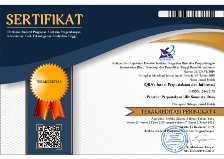Implementing Artificial Intelligence to Enhance Academic Information Retrieval for Final Project Fulfillment: Case Study in Library and Information Science Diponegoro University Students
Abstract
Keywords
Full Text:
PDFReferences
Afzal, W. (2017). A Proposed Methodology for the Conceptualization, Operationalization, and Empirical Validation of the Concept of Information Need. Information Research , 2(3).
Agrawal, V., Bhardwaj, S., Pathak, N., Dixit, J. K., Agarwal, S., & Momin, M. M. (2024). Augmenting Research (pp. 23-32). https://doi.org/10.4018/979-8-3693-1798-3.ch003
Andrade-Hidalgo, G., Mio-Cango, P., & Iparraguirre-Villanueva, O. (2024). Exploring the Impact of Artificial Intelligence on Research Ethics - A Systematic Review. Journal of Academic Ethics. https://doi.org/10.1007/s10805-024-09579-8
Chang, Y.-S., Seong, Y., & Yi, S. (2024). Neural Correspondence to Environmental Uncertainty in Multiple Probability Judgment Decision Support System (pp. 153-164). https://doi.org/10.1007/978-3-031-60728-8_13
Cohen, I. G., Babic, B., Gerke, S., Xia, Q., Evgeniou, T., & Wertenbroch, K. (2023). How AI can learn from the law: putting humans in the loop only on appeal. Npj Digital Medicine, 6(1), 160. https://doi.org/10.1038/s41746-023-00906-8
Harmilawati, Rifqatussa'diyah, Amalia, P., Majid, H. A., & Sahrah, I. A. (2024). Peran Teknologi AI dalam Pengembangan Kemampuan Berpikir Kritis Mahasiswa. Prosiding Seminar Nasional Fakultas Tarbiyah Dan Ilmu Keguruan IAIM Sinjai, 3, 26-31. https://doi.org/10.47435/sentikjar.v3i0.3134
Hilal, S., Yusanto, Y., & Saylendra, A. (2024). Kecerdasan Buatan Sebagai Sumber Motivasi: Perspektif Mahasiswa dalam Menyelesaikan Tugas Akhir. Jurnal Pendidikan Ilmu Pengetahuan Alam (JP-IPA), 5(2), 131-140. https://doi.org/10.56842/jp-ipa.v5i2.395
Mcdonald, N., Razi, A., Badillo-Urquiola, K., Seberger, J. S., Agosto, D., & Wisniewski, P. J. (2023). AI through the Eyes of Gen Z: Setting a Research Agenda for Emerging Technologies that Empower Our Future Generation. Computer Supported Cooperative Work and Social Computing, 518-521. https://doi.org/10.1145/3584931.3611281
Miles, M. B., Huberman, A. M., & Saldana, J. (2014). Qualitative Data Analysis. SAGE.
Miysell, K., & Wasisto, J. (2020). Persepsi Mahasiswa Program Studi Ilmu Perpustakaan Universitas Diponegoro Pada Peluang Kerja Information Professional. Jurnal Ilmu Perpustakaan, 9(2).
Moleong, L. J. (2019). Metode Penelitian Kualitatif. PT Remaja Rosdakarya.
Oladokun, B. D., Enakrire, R. T., Emmanuel, A. K., Ajani, Y. A., & Adetayo, A. J. (2025). Hallucitation in Scientific Writing: Exploring Evidence from ChatGPT Versions 3.5 and 4o in Responses to Selected Questions in Librarianship. Journal of Web Librarianship, 19(1), 62-92. https://doi.org/10.1080/19322909.2025.2482093
Putri, V. A., Carissa, K., Sotyawardani, A., & Rafael, R. A. (2023). Peran Artificial Intelligence dalam Proses Pembelajaran Mahasiswa di Universitas Negeri Surabaya. Prosiding Seminar Nasional, 615-630.
Schryen, G., Marrone, M., & Yang, J. (2025). Exploring the scope of generative AI in literature review development. Electronic Markets, 35(1), 13. https://doi.org/10.1007/s12525-025-00754-2
Setyawan, A. E., Anyan, A., & Anggera, L. (2024). Upaya Meningkatkan Keterampilan Mahasiswa Dalam Menulis Karya Ilmiah Berbantuan Ai (Artificial Intelligence). Jurnal Pengabdian Masyarakat Khatulistiwa, 7(1).
Srivastava, A. P., & Shetye, S. K. (2024). AI-Enhanced Hypothesis Development and Research Questions (pp. 88-113). https://doi.org/10.4018/979-8-3693-1798-3.ch007
Wardani, H. K., Mazidah, E. N., & Hidayah, B. (2024). Potensi dan tantangan kecerdasan buatan sebagai asisten belajar mahasiswa FKIP dalam menyelesaikan tugas akademik. Jurnal Ilmu Sosial Dan Budaya Indonesia, 2(1), 18-30. https://doi.org/10.61476/9mq47w18
Yani, A. (2024). Peran Artificial Intelligence sebagai Salah Satu Faktor dalam Menentukan Kualitas Mahasiswa di Era Society 5.0. Journal of Education Research, 5(2), 1089-1096. https://doi.org/10.37985/jer.v5i2.963
DOI: http://dx.doi.org/10.30829/iqra.v19i2.25335
Refbacks
- There are currently no refbacks.
Copyright (c) 2025 Budhi Yulianto, Roro Isyawati Permata Ganggi

This work is licensed under a Creative Commons Attribution-ShareAlike 4.0 International License.
IQRA': JURNAL PERPUSTAKAAN DAN INFORMASI
Perpustakaan Universitas Islam Negeri Sumatera Utara
Jalan Willem Iskandar Pasar V Medan Estate
20371
Medan - Sumatera Utara






